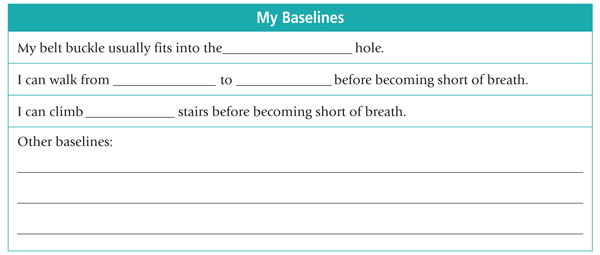The first step to managing heart failure symptoms is getting to know what’s normal for you. How much can you usually do before shortness of breath is a problem? Do your socks and shoes fit comfortably? How much do you weigh? How your symptoms usually feel are your baselines. Knowing what’s normal for you will help you see when symptoms are getting worse. You’ll know because you won’t feel normal anymore. Symptoms that get worse means your heart is under stress. It's having a hard time pumping blood to the rest of your body, and your body may be retaining fluid. Write some baselines in the box below. These will help you measure your symptoms.
Watch for changes
Once you’ve come up with baselines, watch for changes daily. Pay attention to how much you can do today. Is it the same as yesterday? Are your shoes tight? Do you need to use a different belt hole? Can you lie flat in bed to sleep without feeling that you are suffocating? Can you eat without feeling full too soon, or short of breath? Are you gaining weight but eating the same amount?
If today’s symptoms are different from your baselines, you need to take action. The problem won’t go away by itself. So, if you notice even a small change, don’t ignore it. Your health care provider is counting on you to call when you think your symptoms are worse. They will tell you what to do next. Working together this way helps keep heart failure under control and improves the number of good days you have. It could even keep you out of the hospital.



